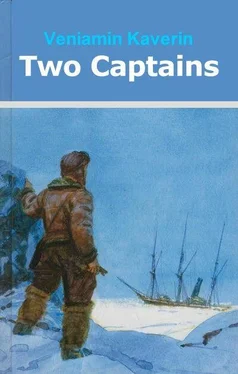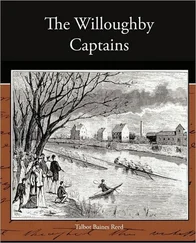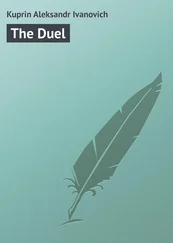At last he turned up, and stopped in the doorway with a thoughtful air, finger on his nose, wondering, if you please, if he had come to the wrong room.
"Come in, Professor, come on in," I said to him.
He ran towards me, laughing and behind him in the doorway appeared a tall-, portly, fair-haired lady, whom we had once known, if I am not mistaken, under the name of Kiren.
First of all I was interrogated, of course. It was a cross-examination, with Valya on the right and Kiren on the left of me. Why, in what manner and on what grounds had I broken into another person's flat, gone through all the rooms, and on discovering that Katya was living at Professor V. Zhukov's, had hit on the brilliant idea of leaving a note that was utterly senseless, since it contained no mention of where I was to be found and how long I would be in Moscow.
"That was her bed, you ass," Valya said. "And the dress on it was hers. Christ, couldn't you have guessed that only a woman's hand could keep my den so tidy?"
"That much I guessed all right."
Kiren burst out laughing, good-naturedly, I think, but Valya made big eyes at me. Obviously, the ghost of the mysterious Zhenka Kolpakchi with the variegated eyes still haunted that family hearth.
The women retired into the next room. Kiren was nursing her fourth child, so I daresay they had plenty to talk about.
We started talking about the war. There were already numerous signs that it would soon be over. Valya and Korablev listened to me with such an expression as if it was I who would be called upon in the very near future to report the capture of Berlin to the High Command. Valya asked why they were not forcing the Vistula and was deeply pained to hear me say I did not know. As for the North, to judge by the questions he put to me, I was in command, not of a squadron, but of the whole front.
Then Korablev began to speak about Captain Tatarinov, and lowering my voice a little so that Katya should not hear, I told them some details which had not been mentioned in the papers. Not far from the Captain's tent, in a narrow cleft between the rocks, we found the graves of the sailors. The bodies had been simply laid out on the ground and covered with large stones. Bears and foxes had got at them and scattered the bones-one skull was found three kilometres from the camp, in the next hollow. Evidently the Captain had spent his last days in the same sleeping bag with the cook Kolpakov, who had died before he did. The letter to Mrs Tatarinova was first addressed "To my wife" and then corrected "To my widow". A wedding ring was found on the Captain's right hand with the initials M.T. on the inside.
I got out of my suitcase and showed them a gold locket in the shape of a heart. On one side of it there was a miniature portrait of Maria Vasilievna, and on the other a lock of black hair. Korablev went over to the window, put on his glasses and examined the locket. He was so long at it that Valya and I ultimately went over to him and putting our arms round him from both sides led him back to his chair.
"Katya is the image of her!" he said with a sigh. "This December it will be seventeen years. I can hardly believe it."
He asked me to call Katya in and told her that he had gone to the cemetery in the spring, planted some flowers there and employed one of the caretakers to paint the railing.
Chapter Seven
TWO CONVERSATIONS
I had two things to attend to in Moscow. One was my paper to -be read before the Geographical Society on how we had found the St. Maria expedition, the other, my talk with the examining magistrate about Romashov. Oddly enough, these tasks were not unconnected, for while I was still at N. Base I had sent to the Procurator's Office a transcript of my talk with Romashov at his flat. I will begin with the second.
The general waiting-room was a dimly lit hall divided in two by a wooden barrier. Broad old-fashioned benches stood against the walls, and a variety of people-old men, girls, servicemen without shoulder-straps-were seated on them, waiting to be interrogated.
I found the office of my interrogating officer by the name on the door, and as it was still early, I occupied myself with shifting the flags on the map which hung in the waiting-room. It wasn't a bad map, but the flags were far behind the present line of the front.
A familiar voice arrested my attention-a well-rounded, mellow, pontifical voice, that instantly made me feel a poorly clad, grimy boy with a big patch on his trousers. The voice said: "May I come in?"
Evidently, he was asked to wait, because, after opening the door, Nikolai Antonich closed it again and set down on the bench with a slightly hurt expression. I had last seen him in the Metro in the summer of 1942, and he was the same as he was then-his manner lordly, dignified, patronising.
Whistling, I moved the flags about on the Second Baltic Front. Seventeen years had passed since the day I had said: "I'll find the expedition and then we'll see who's right." Did he know that I had found the expedition? Undoubtedly he did. But what he did not know-the newspapers had not said a word about it-was that among Captain Tatarinov's papers there had been found incontestable, irrefragable evidence proving that I had been right.
He sat with Us head lowered, hands resting on his walking stick. Then he glanced at me and an involuntary quick movement passed across his large, pale face. "He's recognised me," I thought, exultant. He had recognised me. He looked away.
He was considering at that moment what attitude to adopt towards me. A problem indeed. Evidently, he had disposed of it to his satisfaction, because he suddenly stood up and strode over to me, touching his hat.
"Comrade Grigoriev, if I am not mistaken?"
"Yes."
I don't think I had ever had such difficulty in pronouncing that short word. I, too, had my moment of hesitation in considering what my manner towards him should be.
"You haven't been wasting your time, I see," he went on, glancing at my medal ribbons. "Where do you come from now? On what front are you defending us humble toilers of the rear?"
"The Far North."
"Are you in Moscow for long?"
"On leave, three weeks."
"And obliged to waste precious hours in this waiting-room? Ah, well, it's our civic duty," he added. "I suppose you, too, have been summoned here in connection with Romashov's case?"
"Yes."
He paused. Oh, how familiar were those deceptive, pregnant pauses of his, and how, even as a boy, I had loathed them!
"That man is evil incarnate," he said at last. "I consider that society should rid itself of him, the sooner the better."
Had I been an artist I could have admired this spectacle of smooth hypocrisy. But being an ordinary layman, I felt like telling him that if society had rid itself in time of Nikolai Antonich Tatarinov it would not have had to mess about now with Romashov. But I said nothing.
So far not a word had been said about the St. Maria expedition, but I knew my Nikolai Antonich-he had come up to me because he was afraid of me.
"I've heard," he began tentatively, "that you have succeeded in bringing your undertaking to a happy issue. I want to thank you from the bottom of my heart for all that you have done. But I hope to do that publicly."
This meant that he was coming to hear me read my paper and would try to make out that we were lifelong friends, he and I. He was holding out the olive branch. Very good. I must pretend that I am accepting it.
"Yes, I think I have been more or less successful." I said nothing more. But a faint touch of colour had come into his pale, plump cheeks-a sign of animation. The past was all forgotten, he was now an influential man, why should I not keep on good terms with him? Probably I had changed – after all, didn't life change people? I had become like him-I had decorations, I had made a success, and he could judge of me from his own experience, his own success.
Читать дальше












